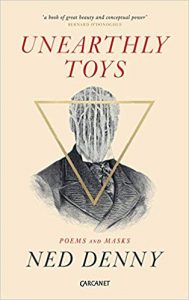Unearthly Toys: Poems and Masks
 Ned Denny is a London-born author/critic whose work has been published in various magazines and publications along. Unearthly Toys: Poems and Masks combines his previous work with a large number of new poems to comprise a very diverse and eclectic book.
Ned Denny is a London-born author/critic whose work has been published in various magazines and publications along. Unearthly Toys: Poems and Masks combines his previous work with a large number of new poems to comprise a very diverse and eclectic book.
Spread throughout the collection are many poems that are directly inspired by, or are remakes of, other famous poets’ works. Such substantial influences are noted by small sub-headings such as “after Baudelaire” or “after Wang Wei”, or sometimes a small quotation before the actual poem as in “Gazelle”, “Dark Green”, and more. These poems in particular carry a certain weight due to their intertextuality as Denny attempts to mould their verses and styles into his own.
Denny’s style develops in the book as the collection moves forward; starting out with poems such as “House Music”, written in a simple three-verse structure with parallel line lengths and rhymes:
Consider the architecture of the fire,
this radiant palace receiving in turn
the great bare mouth of the smallest creature
and the mirrored, steel-cored tower
of your pride; consider that soon
that grim emberresembling the face we all fear or desire
will be the perch where you sing and do not burn,
peace be within thee, vigilant preacher
of the mind-consuming hour
each undergoes and what the moon
must dismember[.]
As the book moves forward Denny plays around and experiments with different poetic forms; he cuts up his stanzas, shrinks down his verses, and moves them across the page. At one point he even switches to prose as in “As It Was in the Beginning”. He pushes his technique to the limit in certain sections, such as the relentless repetition of the phrase, “At the edge of the woods,” in “Waking” and the twenty separated verses of “Wheel River”. All of these pieces are tied together by Denny’s instinctual sense of rhythm. His choice of words roll off of the tongue kindly – at least, for myself – as much as they roll onto the subsequent lines with the frequent use of enjambment throughout.
Denny provides a somewhat indirect commentary on the darker aspects of our lives and thoughts – drugs, death, love, and more. Yet, at no point does he display a sense of apathy or hopelessness amidst the grim demeanour and religious imagery, shown here from “Return”:
Your sleeping forms are not less than divine.
Awaken, amnesiac magicians:
you are gods, take up your true positions.
Children, return to the city of light.
Moments of hope and happiness are presented amidst the melancholic overtones of the collection. There is an intrigue to the subtle messages he intertwines expertly into his poetry, shown here from “Arles”:
When old men die, you said, they go on foot to light
from the darkness of these gardens.
We learn how to live by watching the trees.
Ned Denny’s Unearthly Toys: Poems and Masks is an interesting and destabilising read. It is a charming yet ‒ at times ‒ dark inspection of life where each consecutive poem builds upon the themes that have already been introduced, and adds to the diversity of techniques and form. At the same time, this selection of poems remixes and thrives on the works of renowned poets from Baudelaire to Goethe, giving this book a brilliant intertextuality that will please anyone interested in literary history. It is a book that I have enjoyed and that I hope many others will also enjoy ‒ highly recommended.

Leave a Reply